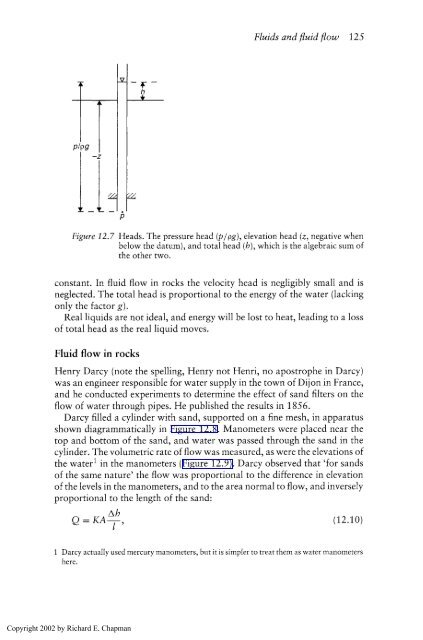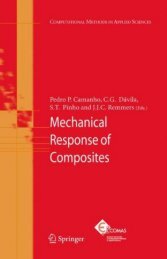Physics for Geologists, Second edition
Physics for Geologists, Second edition
Physics for Geologists, Second edition
Create successful ePaper yourself
Turn your PDF publications into a flip-book with our unique Google optimized e-Paper software.
Fluids and fluid flow 125<br />
Figure 12.7 Heads. The pressure head (plpg), elevation head (2, negative when<br />
below the datum), and total head (h), which is the algebraic sum of<br />
the other two.<br />
constant. In fluid flow in rocks the velocity head is negligibly small and is<br />
neglected. The total head is proportional to the energy of the water (lacking<br />
only the factor g).<br />
Real liquids are not ideal, and energy will be lost to heat, leading to a loss<br />
of total head as the real liquid moves.<br />
Fluid flow in rocks<br />
Henry Darcy (note the spelling, Henry not Henri, no apostrophe in Darcy)<br />
was an engineer responsible <strong>for</strong> water supply in the town of Dijon in France,<br />
and he conducted experiments to determine the effect of sand filters on the<br />
flow of water through pipes. He published the results in 1856.<br />
Darcy filled a cylinder with sand, supported on a fine mesh, in apparatus<br />
shown diagrammatically in Figure 12.8. Manometers were placed near the<br />
top and bottom of the sand, and water was passed through the sand in the<br />
cylinder. The volumetric rate of flow was measured, as were the elevations of<br />
the water1 in the manometers (Figure 12.9). Darcy observed that '<strong>for</strong> sands<br />
of the same nature' the flow was proportional to the difference in elevation<br />
of the levels in the manometers, and to the area normal to flow, and inversely<br />
proportional to the length of the sand:<br />
1 Darcy actually used mercury manometers, but it is simpler to treat them as water manometers<br />
here.<br />
Copyright 2002 by Richard E. Chapman






